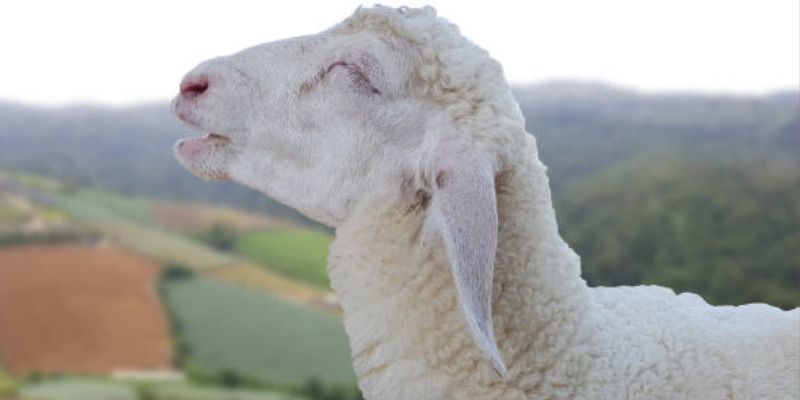Do sheep smell bad? This article directly addresses the question by examining how diet, health, and hygiene affect a sheep’s scent.
Find out why sheep might smell bad and how to keep them smelling fresh. This guide provides tips for farmers and sheep lovers on how to reduce sheep odors for a better experience outdoors.
Do Sheep Smell Bad?
No, sheep themselves do not inherently smell bad. The perception of bad odor is usually due to external factors.
Natural Scent
Sheep, like all animals, have a natural scent. Factors such as lanolin in their wool, their living environment, and their diet can affect this scent. However, it is only sometimes unpleasant.
External Factors
Poor hygiene or an unclean environment often causes the ‘bad’ smell associated with sheep. Unclean conditions lead to urine and feces buildup, resulting in a strong, unpleasant odor.
Wet Wool
Wet wool smells stronger and worse in the rain or without proper shelter.
Health Issues
Health problems like skin infections or parasites change a sheep’s smell, making regular vet visits crucial.
Breed Variations
Sheep breeds vary in scent due to their wool and skin, but these smells are usually not bad.
Overall, sheep don’t naturally smell bad. Odor issues link to their care, weather, and health, so good management keeps smells away.
How To Control Bad Sheep Smell
To control sheep odors, focus on hygiene, diet, and regular vet checks. Here are some practical ways to manage and reduce unpleasant odors:
Clean Living Conditions
Keep the sheep’s barn clean by removing manure, urine, and dirty bedding to stop odor buildup. Good barn ventilation cuts down moisture and ammonia, reducing bad smells.
Proper Diet
A balanced diet low in sulfur reduces sheep odors. Avoiding sudden changes in diet is crucial. Sudden diet changes can upset a sheep’s stomach, leading to bad smells.
Regular Grooming And Shearing
Trimming and cleaning wool through shearing and grooming cuts down on sheep smells by removing dirt and moisture.
Health Check-Ups And Parasite Control
Regular vet check-ups can find and fix health problems like skin infections or tooth issues that may cause smells. Controlling parasites is crucial because they irritate the skin and make smells worse.
Hygienic Handling
Wash your hands and clothes well after touching the sheep. Gloves can help avoid smell transfer.
Manure Management
Dispose of or compost sheep manure to cut down on smells. Use rotational grazing to spread out manure and lessen odor concentration.
Bathing And Spot Cleaning
Sheep usually don’t need full baths. But cleaning their dirty spots with gentle, sheep-friendly cleaners prevents skin problems.
Using these steps helps keep sheep odor down, making the surroundings better for sheep and their handlers.
How Do You Get Bad Sheep Smell Off Your Hands?
Removing the foul smell of sheep from your hands can be done with a few straightforward steps:
- Wash With Soap And Water: Wash your hands well with soap and warm water, scrubbing everywhere, even under nails, for 20 seconds to clean dirt and bacteria.
- Use Lemon Juice Or Vinegar: Rub your hands with a mix of water and lemon juice or vinegar to cut strong smells, then rinse with soap and water.
- Rubbing Alcohol Or Hand Sanitizer: Use rubbing alcohol or hand sanitizer to dissolve smelly oils on your hands.
- Coffee Grounds: Scrub your hands with coffee grounds to absorb and cover up smells, then rinse well.
- Baking Soda Paste: Use a paste of baking soda and water on your hands to remove odors. Rinse after a few minutes.
- Use Protective Gloves: Wear gloves when handling sheep or cleaning their areas to keep smells off your hands.
These methods can remove sheep smells from your hands; a mix of them might work best.
Frequently Asked Questions (FAQs)
Here are some frequently asked questions (FAQs) about sheep and their associated odors:
Do All Sheep Breeds Have The Same Smell?
Different sheep breeds smell differently due to their wool, genetics, and living conditions. Some breeds might smell more potent than others.
Can Sheep’s Diet Affect Their Smell?
Yes, what sheep eat can change how they smell. Foods high in sulfur make their smell stronger.
Is The Smell Of Sheep Harmful To Humans?
The natural smell of sheep isn’t harmful to people. However, lousy hygiene can cause unpleasant or unhealthy odors.
How Often Should Sheep Be Groomed To Control Smell?
Grooming sheep regularly, like brushing and shearing, helps control odors. How often depends on their breed and living conditions, but usually, once or twice a year is enough.
Does Shearing A Sheep Completely Eliminate Its Smell?
Shearing removes dirty wool and lessens the smell but won’t get rid of a sheep’s natural scent.
Are There Any Health Conditions In Sheep That Can Cause Bad Odor?
Health issues like skin infections or dental problems can make sheep smell bad, so regular vet visits are essential.
Can The Smell Of Sheep Attract Predators?
Sheep’s natural smell may draw in predators, so using fences and guardian animals is advised for protection.
Is It Normal For A Sheep’s Smell To Change Over Time?
Changes in a sheep’s diet, health, or environment can alter its smell. Investigate any sudden smell changes for health problems.
Conclusion
The idea that sheep always smell dire needs to be corrected. Their natural scent comes from lanolin in the wool, what they eat, and where they live. This smell is sometimes good, and we can manage it well.
By keeping sheep clean, grooming them often, and looking after their health, we can keep any strong smells to a minimum.
Knowing why sheep smell and using solutions like cleaning and care improves their lives and our experience living with them.

